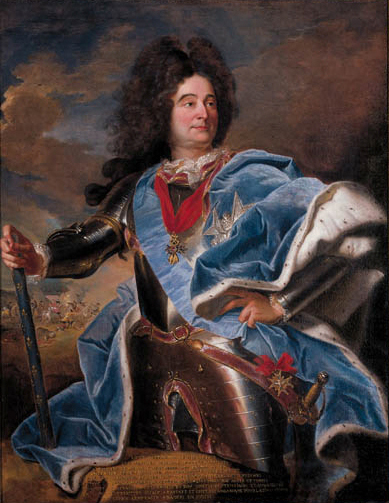The family of Villars originated from the region of Lyonnais where the males of the family had long held positions as échevin (the equivalent of an English alderman). As such, they were considered as part of the lower nobility. However, that was to change over the span of the 16th and 17th century.
By 1586 the family was made a part of the nobility. In the following Grand Siècle the family saw one of its own being raised to the rank of Duke.
1) Claude-Louis-Hector de Villars & Jeanne Angélique Rocque de Varengeville
Claude was born in 1653 and received an excellent education before entered the Grand Écurie where he would join the musketeers. As it happened, his prowess in warfare would be the making of him. Luckily for him, he had the best masters as he served under both Turenne and the Grand Condé. At the same time, he possessed the delicate tact required of diplomat; the combination made him an invaluable tool for a king with such grand ambitions as Louis XIV.
At court, he were the object of some scandal. Apparently, the new duke preferred the company of men (romantically) which sent not a few tongues wagging. Voltaire described him as being greedy for honours - perhaps a sense of inferiority? His ducal title was new and his family could not boast quite the same pedigree as his fellow dukes at court. Nevertheless, his merits was generally acknowledged to include unshakeable bravery and a strong sense of honour.
Eventually, Claude was granted the exalted title of Marèchal Général des Camps et Armées du Roi - one of only six to achieve that honour. He partook in the campaignof the War of the Polish Succession at the age of 80 but it proved to much and he died in Turin in 1734.
Jeanne Angélique was thirty years her husband's junior, being born in 1682. She was the daughter of the seigneur de Varengeville and as such her husband's elevation was a great advancement for her, too.
The couple had a single child - hardly surprising considering that her husband spent the vast majority of his time at war and was a homosexual:
- Honoré-Armand de Villars
 |
| Claude-Louis-Hector |
2) Honoré-Armand de Villars & Amable-Gabrielle de Noailles
Honoré-Armand was born in 1702 and followed in his father's footprints - but only to a certain degree. He served under his father in Italy in 1733. However, he did not spent much time with the army besides this. At court, he was a notable member of the Académie Française. Like his father, Honoré-Armand was homosexual - his sexuality earned him the name of "l'ami de l'homme".
His father's advancement meant that a prestigious marriage was in store for the young Honoré-Armand. He was married to a daughter of the numerous Noailles-family, Amable-Gabrielle de Noailles. Honoré-Armand had a taste for the literary arts and amassed quite an impressive library. After 1750, he spent very little time at court, preferring his private estates where he entertained Voltaire and Duclos.
Amable-Gabrielle was the daughter of the Duc de Noailles and held the position of dame de compagnie to Marie Leszczynska. She would later become dame d'atours to the queen. With such an important office, Amable-Gabrielle was required to remain at court on a permanent basis. When Marie Leszczynska died, Amable-Gabrielle was allowed to remain in her position when Marie Antoinette arrived.
It would seem that their relationship was one in name only. Her husband's preferences meant that the couple never had children; however, Amable-Gabrielle did have a daughter fathered by Jean Philippe d'Orléans (illegitimate son of the Duc d'Orléans). The daughter was named Amable-Angélique and married to the Comte d'Egmont; however, she was soon widowed and entered a nunnery.
When Honoré-Armand died in 1770, the male line died out as did the title.
 |
| Honoré-Armand |
 |
| Amable-Gabrielle |
Interesting facts and anecdotes:
- The house of Villars produced 5 archbishops for the city of Vienne (not Vienna, that is)
- Claude-Louis-Hector had two brothers; Armand died at the siege of Douai and Henri-Félix became a cleric
- Pierre de Villars (father of Claude-Louis-Hectors) served as ambassador to three countries: Spain, Savoy and Denmark
- The Château de Vaux-la-Vicomte became a property of the Duc de Villars in 1710
